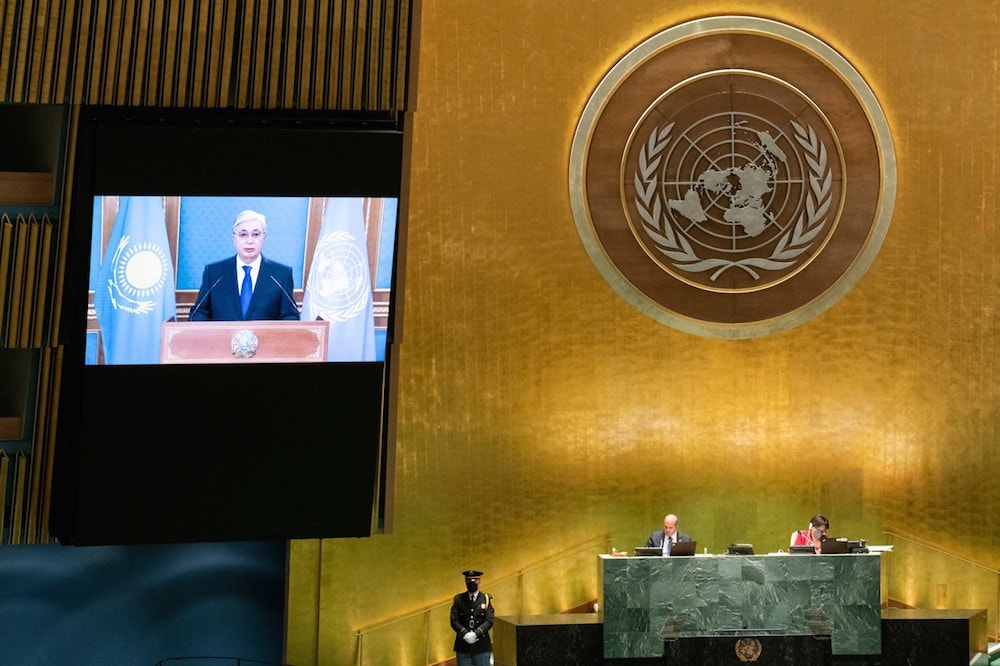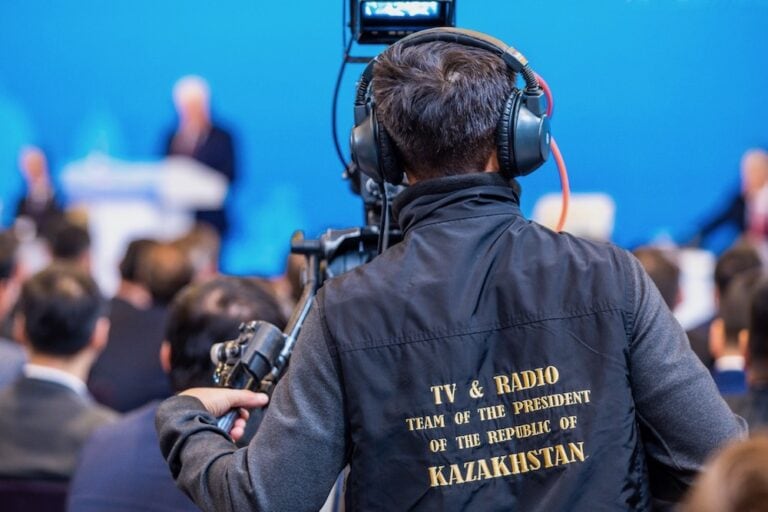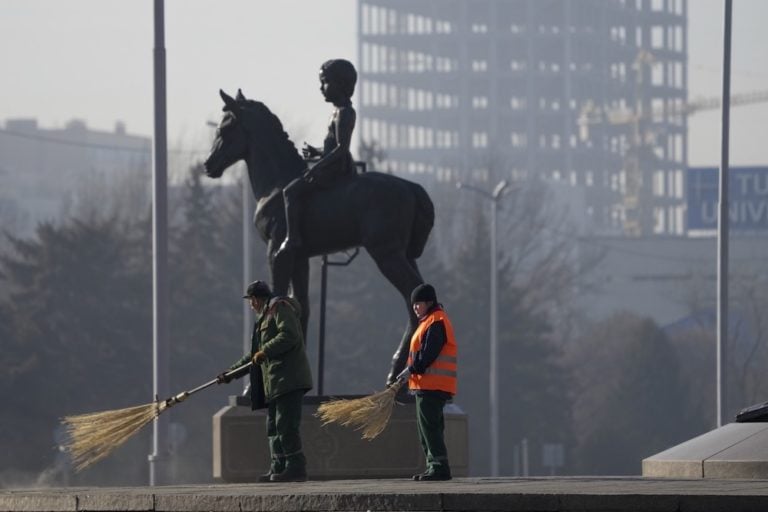“There is an urgent need for the international community to react. This is why we have decided to refer this dangerous deterioration in press freedom to the UN and OSCE."
This statement was originally published on rsf.org on 12 January 2022.
Reporters Without Borders (RSF) has asked the United Nations and the Organisation for Security and Cooperation in Europe to examine the alarming escalation in violence and obstruction to which journalists are being subjected when trying to cover the continuing protests in Kazakhstan and the government’s use of deadly force to suppress them.
The media victims include a TV crew’s driver who was fatally shot while following an official convoy. Muratkhan Bazarbayev was driving an Almaty TV crew to city hall in Almaty, Kazakhstan’s biggest city, when their car came under fire near Republic Square at around 11 p.m. on 6 January. Bazarbayev died instantly while one of the shots hit the right hand of the crew’s technician, Diasken Baytibaev, who had to have two fingers amputated.
The pro-government TV channel crew had been invited by Almaty’s akim (mayor), who wanted to record a message to reassure the public that order had been restored in the city after the previous day’s protests turned into a riot.
Amid growing clashes between violent groups and security forces who have been told they can use live rounds without warning, there has been an alarming surge in cases of obstruction and violence against journalists trying to cover the protests and the deadly “mopping-up operations.”
“It is increasingly dangerous for journalists to cover the situation on the ground, as evidenced by the killing of a TV channel employee,” said Jeanne Cavelier, the head of RSF’s Eastern Europe and Central Asia desk. “Several reporters have been fired on with live rounds, often by the security forces, while others have been arbitrarily arrested for covering protests, in other words, for doing their job.
“There is an urgent need for the international community to react. This is why we have decided to refer this dangerous deterioration in press freedom to the UN and OSCE. We also call on the Kazakh authorities to allow foreign reporters to enter the country to cover events and to refrain from any attempts to censor reporting.”
Arrests
Lukpan Akhmedyarov, the well-known editor of the regional weekly Uralskaya Nedelya, was arrested while on his way to work in the western city of Oral on 7 January and was sentenced to 10 days in prison for “participating in a demonstration” that he had covered. His appeal was rejected on 10 January. Often targeted by the authorities, Akhmedyarov was already summoned and questioned by police on 5 January, as RSF reported last week.
Daryn Nursapar, the editor of the Altaynews website in the eastern region of Kazakhstan, has also been detained since 7 January. Although ShygysAkparat, the state media company that owns the website, had banned all of its journalists from attending demonstrations, Nursapar decided that he had a professional duty to cover events. He was sentenced to 15 days in prison two days after being arrested at home.
In some cases, the authorities have not bothered to give a reason for arresting journalists. In the northwestern city of Aktobe, police searched the apartment of Ardak Erubaeva, a reporter for the independent news site Orda, on 9 January and took her away without offering any explanation. Released at 2 a.m. the next day after interrogation, she attributed her arrest to her coverage of the previous days’ demonstrations and her criticism of the city’s akim. Stanislav Obishchenko, an Almaty-based freelance reporter for the Russian state TV channel RT, was similarly held for a few hours after his arrest on 8 January.
Violence
As well as arbitrary arrest, journalists in the field are also exposed to the possibility of physical violence by the security forces. A uniformed man posted outside Almaty’s morgue fired several shots towards the feet of two journalists on 8 January – Vasili Polonsky, a reporter for the Russian independent TV channel Dozhd (TV Rain), who had been filming him roughing up a man, and Vasili Krestianinov, a reporter for the independent investigative news site The Insider. They managed to get away without being hit.
Freelance photographer Almaz Toleke had to be hospitalised after sustaining a gunshot injury to the leg when soldiers opened fire on his car while he was out reporting in Almaty on the night of 5 January. Although he had all the necessary permits to be outside during curfew hours, he panicked and accelerated when the soldiers ordered him to stop.
Yesenzhol Yelekenov, a trainee reporter with Uralskaya Nedelya, also had to seek medical attention after being beaten when he was arrested and then held for three hours in the western city of Oral on 5 January. As RSF already reported, several other journalists have also been injured during law enforcement operations in other parts of the country.
Groups of rioters have been responsible for some of the violence against journalists. On the afternoon of 5 January, rioters stormed a building in Almaty’s Republic Square that housed the offices of five TV channels – the state channels Kazakhstan and Khabar, the privately-owned pro-government channels Eurasia and KTK, and Mir 24, a channel operated by the Commonwealth of Independent States, a regional intergovernmental organisation. The rioters ransacked the bureaux, destroyed equipment, confined employees in their offices for nearly an hour before releasing them, and then set fire to the building.
Almaz Kaysar, a photojournalist with the Vlast news website, was filming demonstrators in Almaty on 5 January when he was surrounded by individuals wearing masks, armed with sticks. Although wearing a press vest, he was suspected of working for the security services and of trying to identify the demonstrators by photographing them. Other participants tried to defend him, but his mobile phone was grabbed and smashed to the ground. To resume working without being noticed, he had to remove his press vest, although it is required by the law. Farhat Abilov, a photographer working for Ak Zhaik weekly paper, was insulted, beaten and jostled by violent demonstrators while filming clashes with the police in the western city of Atyrau the same day.
Two journalists with the Kazakh news agency KazTAG were also the targets of demonstrator hostility in Almaty, as was Saniya Toyken, the correspondent of Radio Azattyq (the Kazakh service of the Prague-based US broadcaster Radio Free Europe/Radio Liberty) in the southwestern city of Aktau. Ruslan Pryanikov, a photographer with the French news agency AFP, sustained a leg injury when accidentally run down by a car while covering demonstrations in Almaty on the night of 4 January.
Obstruction
The authorities obstruct the work of journalists and media outlets in an effort to maintain their control over news and information. On 10 January in Almaty’s Republic Square, where the security forces had carried out deadly operations during the previous weekend, police forced a reporter for the independent news website Orda to delete photos and ordered him to leave the area.
This was not an isolated case. Reporter Bagdat Asylbek was arrested in the square on 5 January for filming members of a special unit fire on a group of demonstrators. He was forcibly bundled into a police truck and his press and ID cards were confiscated. After arguing with the police, who wanted to delete his videos, he was able to recover his mobile phone and was released. The police also unsuccessfully tried to delete photos and videos of army vehicles that Uralskaya Nedelya reporter Serik Yesenov had taken in the centre of Oral.
Censorship
Internet access was still cut in some parts of the country yesterday afternoon after being restored for brief periods. President Tokayev promised to allow the Internet to be reconnected in regions where calm had returned, but he warned that acts of defamation would be “punished.” This threat applies above all to “free” media outlets publicly branded by Tokayev as “demagogic,” which were warned that criminal proceedings would be adopted in response to the slightest misstep. The information ministry pointed out that, under the state of emergency declared in Almaty and several provinces, the penalty for the “deliberate dissemination of false information” has increased from three to seven years in prison.
After censoring two independent media outlets last week, the information ministry on 10 January demanded the deletion of an article about faction-fighting within the government that Daniil Kislov, the editor of Fergana, an independent news agency specialising in central Asia, had published on 7 January. Refusing to comply with the demand, Fergana asked the authorities to clarify which parts of the article constituted “a threat to the Kazakh society and state.” Access to the site was blocked a few hours later.
The latest method used by the government to prevent independent coverage of the protests and crackdown is to keep the international media at bay. The authorities are delaying the arrival of foreign reporters, including those from the French newspaper Le Monde, although international flights have been maintained. Citing public health grounds, the foreign ministry said an “intergovernmental anti-pandemic commission” would meet to decide on authorisation for foreign citizens to enter the country.
Kazakhstan is ranked 155th out of 180 countries in RSF’s 2021 World Press Freedom Index.



